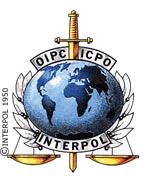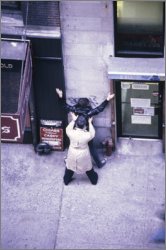What You Need to Know About ... Interpol
by www.SixWise.com
You've probably heard of Interpol and perhaps have an inkling
of an idea what it is, but, like most of us, your knowledge
stops there. What is Interpol and what does this organization
actually do?
|

Interpol's emblem, in use since 1950, includes:
- A globe to signify that Interpol operates worldwide
- Olive branches to symbolize peace
- A vertical sword to represent police action
- Scales to symbolize justice
|
Interpol, which is short for The International Criminal Police
Organization (you may also see it abbreviated as OIPC, or
"Organisation Internationale de Police Criminelle"),
is the world's largest international police organization.
Created in 1923, Interpol now has 184 member countries, which
work to support and assist authorities that combat international
crime.
Interpol becomes especially necessary when two countries
that don't see eye-to-eye must work together to stop crime.
It is one of the organization's primary goals to facilitate
international police cooperation even when diplomatic relations
do not exist between certain regions.
The Structure of Interpol
Leadership and direction at Interpol is broken down into
five sections.
General Assembly: This is the supreme governing
body, made up of delegates from each member country. The
Assembly meets annually.
Executive Committee: A 13-member committee elected
by the General Assembly, including the president, three
vice presidents, and nine delegates.
General Secretariat: Run by the Secretary General,
the Secretariat is located in Lyon, France, and operates
24 hours a day, 365 days a year. Officials from 80 countries
work together here (speaking any of the organization's four
official languages: Arabic, English, French and Spanish).
The Secretariat also has six regional offices in:
National Central Bureaus (NCB): Each member country
maintains an NCB, which is staffed by national law enforcement
officers.
Advisers: Experts who act as advisers may be appointed
by the Executive Committee and confirmed by the General
Assembly.
Interpol's Core Functions
All activities that Interpol carries out are based on three
core functions.
-
Secure global police communication services: This
service, called I-24/7, provides a common platform for
police around the world to communicate and share important
information.
|

Interpol helps put wanted criminals behind bars
by circulating alerts and notices internationally
and maintaining a database of criminal names, fingerprints,
DNA information and more.
|
-
Operational data services and databases for police:
Interpol maintains databases including criminal names,
fingerprints, DNA profiles and stolen property (passports,
art pieces, vehicles) for police worldwide to access.
They also offer services to assist police around the world
in crime prevention and investigations.
-
Operational police support services: Interpol
provides support to law enforcement officials on the scene
with emergency services and operational activities. They
operate a Command and Coordination Center 24 hours a day,
seven days a week.
Priority Crime Areas
Interpol has prioritized the following areas of crime.
Drugs and Organized Crime
Interpol's primary role is to identify new drug trafficking
trends and criminal organizations operating at the international
level. They also assist national and international law enforcement
agencies to fight the production, trafficking and abuse
of cannabis, cocaine, heroin and other synthetic
drugs.
Fugitives
At the request of a member country, Interpol will circulate
internationally (via electronic means) notices that include
identification details and judicial information about wanted
criminals.
Public Safety and Terrorism
Interpol collects, stores, analyzes and exchanges information
about suspected individuals and terrorist groups and their
activities. They also coordinate the circulation of warnings
on terrorists, criminals and weapon threats to police in
member countries. Interpol hosted international bio-terrorism
conferences in 2004 and 2005, at which hundreds of senior
police officials and experts gathered to devise strategies
to counter bio-terrorism.
Trafficking in Human Beings
One of Interpol's objectives is to stop the exploitation
of humans for financial gain. According to the organization,
women in developing countries and young children are particularly
targeted for trafficking, smuggling and sexual exploitation.
Financial and High-Tech Crime
Interpol works to fight against crimes such as currency
counterfeiting, money laundering, intellectual property
crime, payment card fraud, computer virus attacks and cyber-terrorism.
The organization works with Internet service providers,
software companies, central banks and others to devise plans
to stop criminals and protect consumers from such crimes.
Thinking of Joining Up?
If a career fighting crime with Interpol perks your interest,
the organization accepts applications from nationals of all
member
countries to "ensure that the organization remains
truly representative."
They also request that staffers accept the following values,
which they say play an important role in maintaining a harmonious
working environment (among such a diverse group of people):
-
Respect for human rights
-
Integrity
-
Commitment to quality
-
Availability
-
Team spirit
-
Value for money
-
Accountability
Recommended Reading
The
FBI's Ten Most Wanted: A Short History & the Current Ten
Most Wanted
How
to Find Registered Sex Offenders and Child Predators in Your
Area
Sources
Interpol